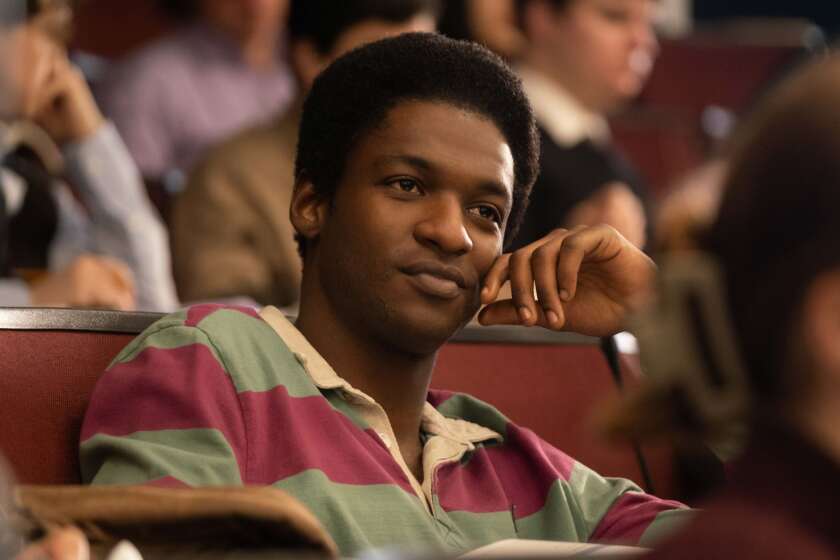The Golden Globes’ diverse group of nominees means Oscar voters have no excuse
With really good marketing and sheer force of will, the Hollywood Foreign Press Assn. has, over the last decade, turned the Golden Globes from a scandal-riven booze fest into a highly rated, influential awards ceremony, a metamorphosis that has never been clearer than this year.
The diverse slate of film acting nominees it announced on Monday sent a clear, early message to Oscar voters dogged by the #OscarsSoWhite label: There can be no excuses this year.
Last year, when faced with criticism for yet another all-white slate of acting nominees, some members of the Academy of Motion Picture Arts and Sciences argued that there simply had been too few nonwhite choices.
This year, the 85 voting members of the HFPA identified an array of possibilities that included nominating six black actors — Denzel Washington and Viola Davis for “Fences,” Mahershala Ali and Naomie Harris for “Moonlight,” Ruth Negga for “Loving” and Octavia Spencer for “Hidden Figures.” Also nominated: “Lion’s” Dev Patel, British-born to Indian parents.
Beyond that, Globes voters also took the opportunity to recognize a wide range of stories, saluting movies driven by women, such as “Florence Foster Jenkins,” which tells the true story of a New York socialite whose inability to sing didn’t stop her from trying, and “20th Century Women,” a poignant look at a free-thinking, independent mother raising her son beyond the bounds of convention.
“Hidden Figures,” a drama about the black women mathematicians who helped launch John Glenn into space, scored two nominations, including a nod for supporting actress Spencer.
“It is nice to have more inclusion — and inclusion across the board,” said “Moonlight” writer-director Barry Jenkins, whose coming-of-age drama received six nominations. “Looking at the types of movies nominated in the best picture categories, especially in this post-election world, it’s really this beautiful snapshot of what America is right now. And it’s not just a monolith. I think that’s the biggest statement.”
Full coverage: 2017 Golden Globes Awards »
By casting its net wide, the Globes continued a trend. In the wake of January’s Oscars So White controversy, . the SAG Awards and Emmy Awards ceremonies practically flaunted their inclusive sets of winners and nominees.
“Here in Hollywood, the only thing that we value more than diversity is congratulating ourselves on how much we value diversity,” Emmys host Jimmy Kimmel joked in his opening monologue at the September show. “I’ll tell you, the Emmys are so diverse this year, the Oscars are now telling people we’re one of their closest friends.”
Now the question is: Will film academy members follow suit?
“It’s not like voters are going to have to go out of their way to look for worthy names,” said veteran awards consultant Tony Angellotti. “There are a lot of bona fide candidates, not just fringe people who, if you vote for them, it might look like you’re just responding to the controversy. Every one of these people are great actors delivering strong performances.”
The Jan. 24 Oscar nominations will also be the first since the academy invited its largest and most diverse set of new members ever — 683 industry professionals, 46% of them female and 41% people of color. What effect those newcomers might have on this year’s nominees remains to be seen, though many new members think that a shift in sensibility is inevitable.
“There’s a real art-house sensibility to this new class,” says German director Maren Ade, who joined this year. “They invited a lot of European filmmakers, as well as Asians too, people who see things and value things a bit differently, simply because they come from a different life experience.”
Sharing — and illuminating — that distinct life experience was the impetus for such films as “Moonlight,” the drama depicting three periods in the life of a young black man as he struggles with, and ultimately learns to accept, his gay identity. Made for a pittance, the film has grossed nearly $11 million, a figure that will likely balloon with the Globes and (potential) Oscars nominations.
I do think it’s one of these movies that has the ability to change the way people look at life and each other.”
— Naomie Harris
“I do think it’s one of these movies that has the ability to change the way people look at life and each other,” said “Moonlight” actress Harris, Golden Globe-nominated for playing the film’s drug addict mother.
Her “Moonlight” castmate, Ali, also a Globe nominee, added: “I just hope that that’s something that is the norm moving forward, where there are people from all walks of life and different cultures and communities in some way, shape or form being represented on screen, and their work being appreciated and recognized.”
The academy’s diversity push also heightened the way that movies like “Moonlight,” “Hidden Figures,” “Fences” and “Loving” were marketed and discussed.
“I feel like there is a stronger interest in our movie’s subject matter right now,” said director Jeff Nichols of his movie “Loving,” which tells the story of Mildred and Richard Loving, the couple who fought the state of Virginia to recognize their interracial marriage. “There’s a hunger for stories about another kind of hero.”
Whether this year’s inclusiveness, which has yet to appreciably extend to Latino, Asian and other minority filmmakers, becomes the new normal or is a one-and-done aberration is open to debate. The 2017 release schedule is littered with traditional, older-white-male-friendly titles like Christopher Nolan’s World War II epic, “Dunkirk,” and Joe Wright’s Winston Churchill drama, “Darkest Hour.”
But there’s also a drama about the 1967 Detroit riot directed by Kathryn Bigelow, who won the Oscar for “The Hurt Locker.” And there are likely a handful of smaller movies, like “Moonlight” and “The Birth of a Nation” — the high-profile Sundance sensation about Nat Turner’s slave revolt that flamed out early — that are currently hidden in plain sight.
Having spoken to his indie filmmaker friends since the release of “Moonlight” and its subsequent success, Jenkins said he has heard whispers that studios and financiers might be increasingly open to distinct, diverse stories.
“I think that there’s an informal mandate that everyone is feeling right now,” Jenkins said. “And I think great work — work that is needed -- is going to come out of it.”
Times staff writer Tre’vell Anderson contributed to this story.
Twitter: @glennwhipp
ALSO:
Full list of 2017 Golden Globes nominees
The biggest snubs and surprises... “Deadpool?”
More to Read
Only good movies
Get the Indie Focus newsletter, Mark Olsen's weekly guide to the world of cinema.
You may occasionally receive promotional content from the Los Angeles Times.











